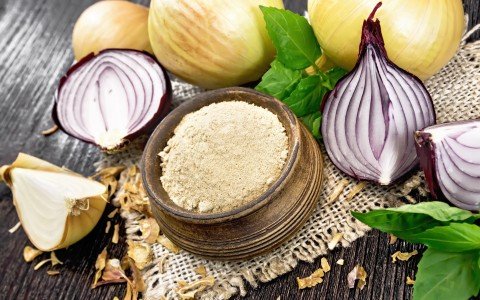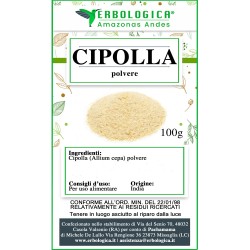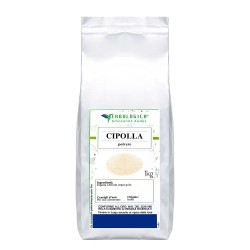
Cipolla come usarla e i suoi benefici per l'organismo
Hai mai considerato la cipolla come un vero superfood?
Se la tua risposta è no, potresti essere piacevolmente sorpreso!
La cipolla, con il suo sapore distintivo e il suo impatto sulla cucina di molte culture, è molto più di un semplice ingrediente per insaporire i tuoi piatti.
Infatti, la cipolla offre una vasta gamma di benefici per la salute che potrebbero sorprenderti.
Ricca di vitamine, minerali e antiossidanti, la cipolla è conosciuta per le sue proprietà antibatteriche e anti-infiammatorie.
Non solo aiuta a rafforzare il sistema immunitario, ma può anche contribuire a ridurre l'infiammazione nel corpo.
Inoltre, è un vero e proprio aiuto digestivo grazie al suo contenuto di fibre.
Le fibre alimentari presenti nella cipolla possono contribuire a migliorare la salute intestinale e favorire la regolarità del transito intestinale.
Quindi perché non iniziare a sfruttare i benefici della cipolla nella tua dieta quotidiana?
Scoprirai che oltre ad aggiungere un delizioso sapore ai tuoi piatti, la cipolla può fare davvero molto per il tuo benessere generale.
Cos'è una cipolla?
E' una pianta appartenente alla famiglia delle Alliaceae ed è coltivata in tutto il mondo per il suo bulbo commestibile.
Il bulbo è composto da strati sovrapposti che contengono sostanze nutritive essenziali come vitamine, minerali e antiossidanti.
Sono disponibili in diverse varietà, con diverse forme, colori e sapori.
Alcuni esempi di varietà comuni di cipolle includono la cipolla bianca, la cipolla rossa, la cipolla dolce e la cipolla primaverile.
Ogni varietà ha le sue caratteristiche uniche e può essere utilizzata in modi diversi in cucina.
I benefici nutrizionali della cipolla
E' un alimento a basso contenuto calorico ma ricco di sostanze nutritive essenziali.
Contiene vitamine come la vitamina C, la vitamina B6 e l'acido folico, che svolgono un ruolo importante nel supportare la salute generale del corpo.
E' una buona fonte di minerali come il potassio, il magnesio e il calcio.
Questi minerali sono essenziali per il corretto funzionamento del corpo e contribuiscono a mantenere l'equilibrio elettrolitico, la salute delle ossa e la contrazione muscolare.
E' anche ricca di antiossidanti, come i composti di zolfo e la quercetina.
Gli antiossidanti aiutano a neutralizzare i radicali liberi nel corpo, riducendo il rischio di malattie croniche e sostenendo la salute generale del corpo.
I benefici per la salute della cipolla
Offre una serie di benefici per la salute che vanno oltre il suo sapore delizioso.
Ecco alcuni dei principali benefici per la salute associati al consumo di cipolla:
Rafforzamento del sistema immunitario:
Grazie al suo contenuto di vitamina C e altri antiossidanti, può aiutare a rafforzare il sistema immunitario e proteggere il corpo dalle malattie.
Proprietà antibatteriche:
Contiene composti con proprietà antibatteriche, che possono aiutare a combattere l'infezione e proteggere il corpo dai batteri nocivi.
Effetto antinfiammatorio:
Gli antiossidanti presenti possono aiutare a ridurre l'infiammazione nel corpo, riducendo così il rischio di malattie infiammatorie come l'artrite.
Salute del cuore:
Alcuni studi suggeriscono che il suo consumo può contribuire a ridurre il rischio di malattie cardiovascolari, grazie ai suoi effetti benefici sulla pressione sanguigna e sui livelli di colesterolo.
Sostegno alla salute digestiva:
Grazie al suo contenuto di fibre, può aiutare a migliorare la salute dell'intestino e favorire una regolare funzione intestinale.
Questi sono solo alcuni esempi dei benefici per la salute associati al suo consumo.
Incorporarla nella tua dieta quotidiana può essere un modo semplice ed efficace per migliorare il tuo benessere generale.
Tipi di cipolle e i loro utilizzi
Sono disponibili in una varietà di tipi, ognuno con il proprio sapore e utilizzo unico in cucina.
Ecco alcuni dei tipi di cipolle più comuni e come possono essere utilizzate:
Cipolla bianca:
Questo tipo ha un sapore leggermente più delicato rispetto ad altre varietà ed è spesso utilizzata in insalate, salse e piatti a base di pesce.
Cipolla rossa:
Ha un sapore più dolce ed è perfetta per l'utilizzo crudo in insalate e salse.
Cipolla dolce:
Questa varietà ha un sapore molto dolce e viene spesso utilizzata per cucinare piatti dolci come marmellate o caramelle di cipolla.
Cipolla primaverile:
Sono piccole e hanno un sapore delicato.
Sono perfette per l'utilizzo crudo in insalate o come guarnizione per piatti principali.
Ogni tipo ha le sue caratteristiche uniche e può essere utilizzato in modi diversi in cucina.
Sperimenta con diversi tipi di cipolle per scoprire quello che preferisci e aggiungi un tocco di sapore alle tue ricette.
Come selezionare e conservare le cipolle
Quando acquisti cipolle, è importante selezionare quelle che sono fresche e di alta qualità.
Ecco alcuni consigli su come selezionarle e conservarle:
Scegli cipolle che siano ferme e senza ammaccature:
Dovrebbero essere ferme al tatto e senza segni di ammaccature o danni.
Controlla la pelle: La pelle dovrebbe essere liscia e senza segni di muffa o macchie.
Conservale in un luogo fresco e asciutto:
Possono essere conservate in un luogo fresco, come la dispensa o il ripostiglio, lontano dalla luce solare diretta e da fonti di calore.
Evita di conservarele vicino ad altri alimenti:
Possono assorbire odori e aromi da altri alimenti, quindi è meglio conservarle separatamente.
Seguendo queste linee guida, potrai selezionare e conservarele in modo corretto, mantenendo la loro freschezza e qualità.
Diversi modi per utilizzare le cipolle in cucina
Possono essere utilizzate in una varietà di modi in cucina per aggiungere sapore e nutrimento ai tuoi piatti.
Ecco alcuni modi comuni per utilizzare le cipolle:
Soffriggere:
Uno dei modi più comuni per utilizzare le cipolle è soffriggerle.
Soffriggerle in olio d'oliva o burro fino a renderle traslucide e leggermente dorate.
Soffritte possono essere utilizzate come base per molti piatti, come zuppe, salse e sughi.
Cipolla cruda:
Crude possono essere tagliate a fette sottili e utilizzate in insalate, salse o come guarnizione per hamburger e sandwich.
Caramellizzare:
Caramellizzarle è un processo lento e dolce che dona loro un sapore dolce e morbido.
Caramellate sono deliziose da aggiungere a piatti come panini, pizze o formaggi.
Marinare:
Possono essere marinare in aceto o limone per renderle più tenere e aggiungere un tocco di acidità a piatti come insalate o tacos.
Sottaceti:
Possono essere sottaceti in aceto o salamoia per un sapore unico e croccante.
I sottaceti sono perfetti come condimento per hot dog, hamburger o insalate.
Sperimenta con diversi metodi di preparazione delle cipolle per aggiungere sapore e variare i tuoi piatti.
Rimedi a base di cipolla per disturbi comuni
Oltre ad essere un alimento versatile in cucina, può essere utilizzata anche per trattare alcuni disturbi comuni.
Ecco alcuni rimedi a base di cipolla che potresti trovare utili:
Rimedio per la tosse:
Il succo può essere combinato con miele e limone per creare un rimedio naturale per la tosse.
Questo rimedio può aiutare a lenire la gola irritata e ridurre la tosse.
Rimedio per il mal di testa:
Le fette di cipolla possono essere applicate sulla fronte per ridurre il mal di testa e alleviare il dolore.
Rimedio per punture di insetti:
Applicare una fetta di cipolla sulla puntura di insetto può aiutare a ridurre il prurito e l'infiammazione.
Rimedio per bruciature:
Applicare il succo di cipolla sulla pelle bruciata può aiutare a lenire il dolore e favorire la guarigione.
Questi sono solo alcuni esempi di rimedi a base che possono essere utili per alleviare alcuni disturbi comuni.
Tuttavia, è importante ricordare che se hai sintomi persistenti o gravi, è sempre consigliabile consultare un medico.
Come incorporare le cipolle in una dieta sana
ossono essere facilmente incorporate in una dieta sana e equilibrata.
Ecco alcuni consigli su come includere le cipolle nella tua alimentazione quotidiana:
Aggiungi le cipolle in zuppe e stufati:
Sono un ingrediente versatile che può essere aggiunto a zuppe e stufati per aggiungere sapore e nutrimento.
Utilizzale come guarnizione:
Aggiungi fette di cipolla alle tue insalate, sandwich o hamburger per un tocco di sapore in più.
Prepara salse e condimenti a base di cipolle:
Possono essere utilizzate come base per preparare salse e condimenti come la salsa di cipolla o la salsa di cipolla dolce.
Cotti al forno o grigliati:
Possono essere cotte al forno o grigliate per un sapore più dolce e morbido.
Cotte al forno o grigliate possono essere servite come contorno o aggiunte a piatti come panini o pizze.
Aggiungile ai tuoi piatti di carne o pesce:
Sono utilizzate come base per preparare piatti di carne o pesce, aggiungendo sapore e tenerezza.
Sperimenta con diverse ricette e modi di preparazione per scoprire come le cipolle possono arricchire la tua alimentazione quotidiana.



